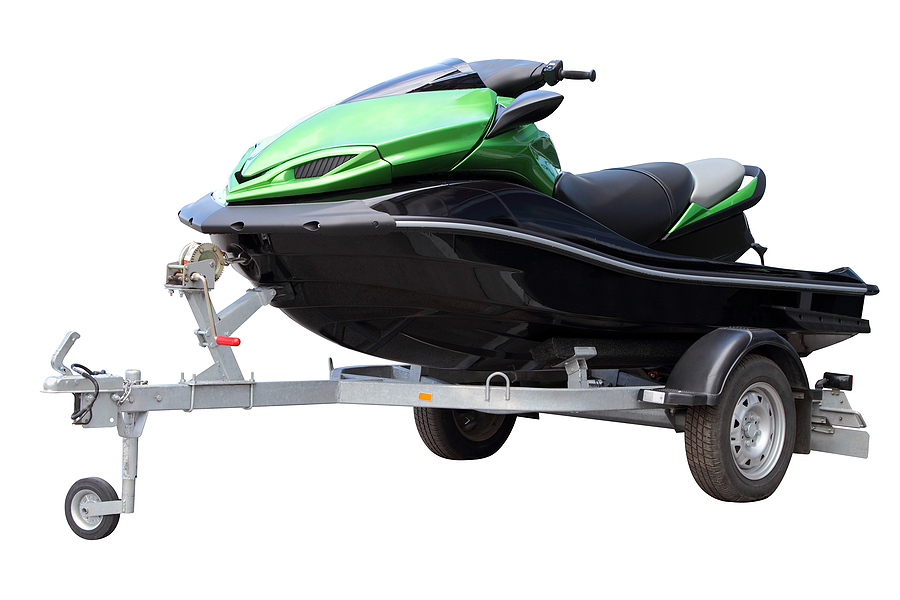Whether yours is a Wave Runner, Sea-Doo, Jet Ski, or some other type of personal watercraft, you likely have a trailer to get it from point A to point B. As the owner of a personal watercraft, you understand how important it is to take good care of your asset considering it’s an expensive and potentially dangerous piece of equipment. However, many personal watercraft owners tend to overlook the needs of the watercraft’s trailer. Trailers require maintenance too, and without proper routine maintenance, you can expect to run into some mechanical and operational issues down the line. Both of which can lead to serious accidents, injuries, and costly structural damage. Fortunately, all of these scenarios can be avoided with some regular watercraft trailer maintenance.
Continue reading to learn the top six maintenance tips you need to know when it comes to taking care of your personal watercraft trailer.

Routine Cleaning
all trailers require some light routine cleaning in order to keep them in superior condition. This simply involves taking a microfiber cloth to the surface areas, eliminating dust and debris that accumulates over a period of a couple of days. For a deeper claim, opt for a degreasing agent or some other cleaner that safe for the type of metal your trailer is made of. This can remove rust and other surface blemishes, thus polishing up the exterior quite nicely. On a less regular basis but still on schedule, it is a good idea to use a mild soap and water solution on your trailer, and rinsed clean with a garden hose.
Lubrication
along with regular cleaning, a watercraft trailer also needs its mechanical and moving parts lubricated periodically. It is recommended to use a spray lubricant product, which is available at any local home improvement store or even at your local department store. Be sure to treat all exposed parts that are moving or mechanical, including hubs, hinges, bolts, springs, and a tongue jacket your trailer has one. If your personal watercraft trailer happens to have grease nipples, you can also treat them with the grease gun.
Wheel Bearings
Be sure to give your wheel bearings an inspection every once in a while. You might need to get them repacked. Talk to the manufacturer to see what your personal watercraft trailer requires in terms of wheel bearing and hub maintenance.
Tires
T will he tires on your trailer make the most contact with the ground, which means they experience a higher level of wear and tear. For this reason, it is important to regularly inspect your personal watercraft trailer tires to ensure they are properly inflated and without any defects. Look for problems like bulging sidewalls, cracked sidewalls, tread wear, and tire blowouts.
Hitch
Your hitch system to your personal watercraft trailer is one of the most important components considering a connects your trailer to your towing vehicle. Regularly inspect your hitch set up to ensure the hitch ball, trailer hitch coupler, safety chains, and wiring systems are all properly connected and operational. If you want us to check to see if your hitch ball is properly level, simply drop a few dollops of water on the very top. Watch how the water droplets fall, and this can give you an indication on whether your hitch ball is tipped up, down, or tilted forward.
Lighting System
Last, inspect your trailer’s lighting system to ensure the brake lights, turn signals, hazard lights, taillights, and parking lights are all connected to your towing vehicle’s lighting system and operational. Before each use, it is important to check the lighting system to ensure all of the lights are probably working. You will get pulled over by law enforcement if your lighting system on your trailer is not synced up with your towing vehicle.
Going a Long Distance? Choose Professional Towing Service for Your Boats and Watercrafts!
Central Indiana Long Distance Boat Towing Services You Can Trust
Call Zore’s Towing at 317-247-8484 for long distance boat towing services in Indianapolis and throughout Central Indiana. Our friendly staff is waiting by the phones, ready to help you get back on the road, safe and sound. We operate 24 hours a day, 7 days a week, and 365 days a year, so you can always count on us. Request a free estimate, today.

